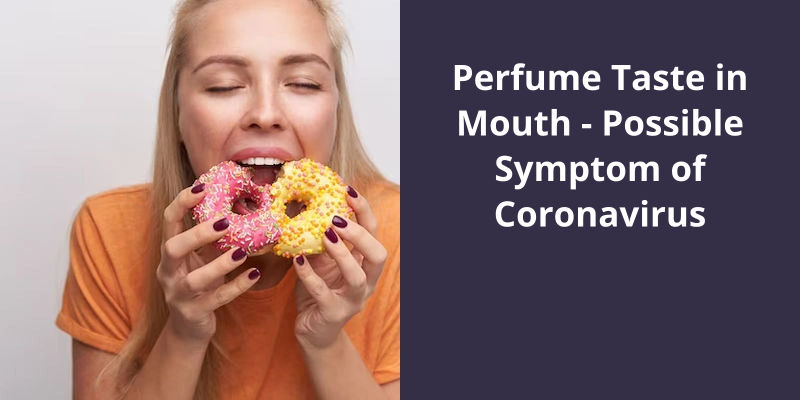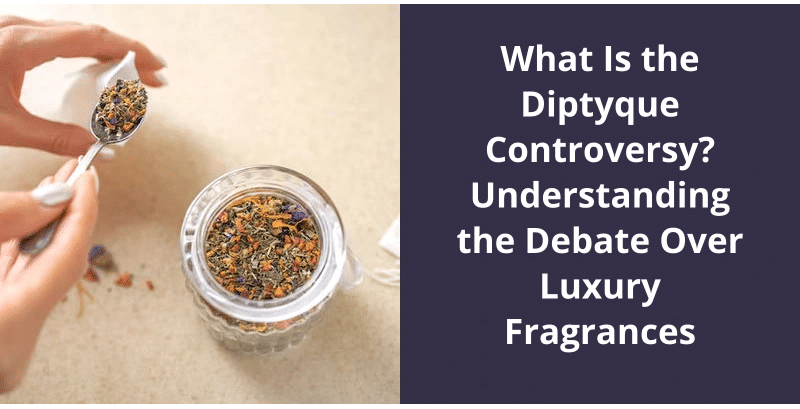Experiencing a perfume taste in your mouth can be due to various causes, including some health conditions. One of these is Dysgeusia, a condition where your sense of taste is altered. Certain medications, infections, or even allergies can cause this too. It’s worth mentioning that some people infected with the COVID-19 virus have reported experiencing unusual tastes or smell issues, including a perfume-like taste in the mouth. However, it’s important not to jump to conclusions based solely on this symptom. If it persists or is accompanied by other symptoms such as fatigue, cough, fever, or loss of appetite, it is advisable to seek medical advice.

Does Coronavirus Change Taste?
The coronavirus pandemic has impacted billions of people around the world. One of the lesser-known symptoms of the virus is that it can change our sense of taste. This can be a frustrating experience for anyone who loves to eat, cook or entertain. While some people may not notice any difference in their sense of taste, others may find that their taste buds seem to have gone haywire.
Experts suggest that the changes in our sense of taste are usually temporary, and should resolve themselves within a few weeks or months. However, this can be a difficult period for anyone who loves to enjoy food and drink. Many people find that the foods they once loved now taste bland or tasteless. Others may experience unusual tastes or sensations, such as a metallic or bitter flavor.
There are a number of strategies that people can use to cope with changes in their sense of taste. For example, some people find that they need to experiment with new flavors and spices to make foods taste more interesting. Others may prefer to avoid foods altogether that they once loved but can no longer tolerate. Additionally, many people find that they need to eat smaller, more frequent meals, rather than trying to eat large meals that they can no longer enjoy.
How Does COVID-19 Affect Our Sense of Smell?
COVID-19 can affect our sense of smell by causing a temporary loss of smell, also known as anosmia. This can happen even in the absence of other symptoms, and it’s thought to be due to the virus directly affecting the olfactory nerves in the nose. In some cases, the loss of smell can last for weeks or even months after the other symptoms of COVID-19 have resolved.
As we continue to learn more about COVID-19, it’s become clear that the virus can affect our senses in unexpected ways. One of the less-common symptoms that’s been reported is a loss of smell, often accompanied by other sensory changes such as a strange metallic taste in the mouth. In this article, we’ll take a closer look at the link between COVID-19 and taste and smell changes, and explore what you can do if you’re experiencing these symptoms.
Does COVID Cause Weird Taste and Smell?
Despite being primarily associated with respiratory symptoms like coughing, fever, and shortness of breath, COVID-19 can also produce unusual sensory changes like a loss of taste and smell, a bitter taste in the mouth, or even phantom smells that arent actually present. These can be particularly troubling for patients, as they can make it difficult to enjoy food or become alarmed by unexpected sensations.
In fact, loss of smell has been reported in up to 80% of COVID-19 cases, meaning it’s far from a rare occurrence. It’s also worth noting that these symptoms can appear in patients with mild or asymptomatic cases of COVID-19, not just those with severe illness.
While sensory changes may seem less concerning than other COVID-19 symptoms like difficulty breathing, they can still have a significant impact on quality of life for patients. They may also be important diagnostic markers for the disease, especially in patients who’re otherwise asymptomatic or have mild symptoms. As such, it’s important for healthcare providers to be aware of these less-common COVID-19 symptoms so they can properly diagnose and treat patients.
This can be frustrating for patients, as it can make it difficult to enjoy food or fully recover from the illness. However, in most cases, these symptoms gradually improve over time and should eventually return to normal.
As researchers continue to study COVID-19 and it’s effects, it’s likely theyll learn even more about these and other unusual symptoms associated with the disease.
It’s quite common to experience a weird taste in your mouth every now and then. It can be caused by various factors such as poor dental hygiene, sinusitis, salivary gland infection, and gastroesophageal reflux disease (GERD). In addition, certain medications can also result in a bad taste in your mouth. In the following sections, we’ll explore these causes in more detail and suggest some remedies to help alleviate the symptoms.
What Causes You to Have a Weird Taste in Your Mouth?
Gastrointestinal reflux disease, commonly known as GERD, occurs when stomach acid flows back into the esophagus, causing discomfort and a sour taste in the mouth. This condition can be managed through lifestyle changes, such as avoiding trigger foods and losing weight. In more severe cases, medication or surgery may be necessary to alleviate symptoms.
Salivary gland infection, or parotitis, can also cause a strange taste in the mouth. The parotid glands are located in the cheeks and can become infected, leading to swelling and pain. Often, this infection is caused by a virus or bacterial infection. Treatment may include antibiotics, pain relievers, and warm compresses to alleviate swelling.
This condition occurs when the sinuses become inflamed and the nasal passages become congested. As mucus builds up, it can travel down the back of the throat, leading to a metallic or unpleasant taste. Over-the-counter or prescription medication may be prescribed to relieve symptoms, and nasal irrigation with a neti pot or saline solution may also be helpful.
Poor dental hygiene is a common cause of bad breath and an unusual taste in the mouth. When plaque and bacteria build up on teeth and gums, it can lead to gum disease, tooth decay, and halitosis. Brushing twice a day, flossing regularly, and visiting the dentist for regular cleanings can help prevent these issues.
Certain medications, including antibiotics and antidepressants, can also cause dysgeusia. This side effect is usually temporary and goes away once the medication is discontinued. However, it’s important to discuss any unusual symptoms with a healthcare provider to ensure there are no underlying medical conditions causing the issue.
By seeing a healthcare provider, practicing good dental hygiene, and making lifestyle changes, many of these causes can be managed or even prevented.
Other Medical Conditions That Can Cause a Strange Taste in the Mouth, Such as Diabetes, Liver Disease, and Kidney Disease
- Diabetes
- Liver disease
- Kidney disease
If you’ve ever experienced a strange taste or smell, you’re not alone. Many people experience smell and taste disorders at some point in their lives. While some are born with these disorders, most are caused by various illnesses such as cold or flu, COVID-19, sinus infection, and allergies. In this article, we’ll explore the causes of smell and taste disorders and what you can do to manage them.
Why Do I Have a Weird Taste and Smell?
Have you ever experienced a strange taste or smell that just doesn’t seem to go away? If so, youre not alone. Millions of people around the world suffer from smell and taste disorders, which can be caused by a variety of factors. Some people are born with these disorders, but most are caused by illness or other external factors.
When you’ve a cold or flu, your nose and sinuses become congested, which can make it harder to smell and taste food. COVID-19 has also been known to cause smell and taste disorders as one of it’s many symptoms. Additionally, sinus infections and allergies can cause inflammation in the nasal passages that affect your sense of smell and taste.
If you’ve recently had a head injury or started taking a new medication, you should talk to your doctor about any changes in your sense of smell or taste. Exposure to toxic chemicals, such as pesticides or solvents, can also cause damage to your sense of smell and taste over time.
Unfortunately, there’s no one-size-fits-all solution to smell and taste disorders. Treatment depends on the underlying cause of your symptoms. For example, if you’ve a sinus infection, your doctor may prescribe antibiotics to clear up the infection. If your symptoms are caused by medication, your doctor may switch you to a different medication or adjust your dose.
If youve experienced a sudden loss of smell or taste, it’s important to seek medical attention right away. This could be a sign of a more serious underlying condition, such as a brain tumor or neurodegenerative disease. By getting a proper diagnosis and treatment, you can improve your overall quality of life and prevent further damage to your sense of smell and taste.
No matter what the cause of your symptoms, it’s important to seek medical attention as soon as possible.
How to Cope With Smell and Taste Disorders
Smell and taste disorders can be frustrating and isolating, but there are ways to cope with them. Some tips include trying different foods and spices, using visual cues to identify food, and seeking out support from others who’re experiencing similar challenges. It’s also important to consult with a healthcare professional to rule out any underlying medical conditions that could be causing the disorder.





